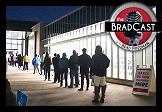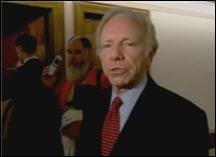'Christian Faith Requires Personal Sacrifice' Says Divinity Student Protesting Law Said to Ensure Republican Control of Scandal-Ridden Ohio
To protest what Free Press investigative reporters describe as a "holiday burial for American Democracy" in the Buckeye State, Ohio divinity student and Columbus resident, Jonathan Meier is continuing his prayer vigil and hunger strike at the Ohio Statehouse despite heavy snow and brutally cold winter temperatures.
House Bill 3 has already passed the House and is about to be approved by the Republican-dominated Senate in the ground-zero snakepit of GOP political corruption otherwise known as Ohio.
Activist Meier, in a just-issued press release says "that his Christian faith calls him to 'constantly pursue social justice and illuminate social ills, and, often, this call requires personal sacrifice."
Free Press' Bob Fitrakis and Harvey Wasserman recently described the latest onslaught to democracy in Ohio, which Meier is protesting, this way:
HB3's most publicized provision will require positive identification before casting a vote. But it also opens voter registration activists to partisan prosecution, exempts electronic voting machines from public scrutiny, quintuples the cost of citizen-requested statewide recounts and makes it illegal to challenge a presidential vote count or, indeed, any federal election result in Ohio. When added to the recently passed HB1, which allows campaign financing to be dominated by the wealthy and by corporations, and along with a Rovian wish list of GOP attacks on the ballot box, democracy in Ohio could be all but over.
Says Meier, "Most people don't realize that this legislation, if passed by the senate next week, would make it virtually impossible for homeless folks to vote, would make it virtually impossible for groups to register large numbers of voters, would eliminate oversight of voting machines, and would cancel our right to challenge election results."
He added, "Instead of addressing the long lines at the polls, instead of making it easier for people to register and to vote, Republican lawmakers put forward 424 pages of legislation that will set up roadblocks to our democracy. I, for one, do not trust a vote reform bill that is purely a partisan act."
Fitrakis and Wasserman put the Ohio legislation in context for the rest of the country, where similar bills are being explored by various Republican-controlled legislatures:


 Sunday 'Your Choice' Toons
Sunday 'Your Choice' Toons The GOP 'Voter Fraud'
The GOP 'Voter Fraud' 'Green News Report' 10/31/24
'Green News Report' 10/31/24
 'Closing Arguments'with Digby and Driftglass: 'BradCast' 10/30/24
'Closing Arguments'with Digby and Driftglass: 'BradCast' 10/30/24 Trump Promises to be a Lawless, Authoritarian President. Believe Him: 'BradCast' 10/29/24
Trump Promises to be a Lawless, Authoritarian President. Believe Him: 'BradCast' 10/29/24 'Green News Report' 10/29/24
'Green News Report' 10/29/24 Ballots Burn, Billionaires 'Obey in Advance', Callers Ring In: 'BradCast' 10/28/24
Ballots Burn, Billionaires 'Obey in Advance', Callers Ring In: 'BradCast' 10/28/24 Musk's Privatized Internet Satellite System Threatens U.S. National Security
Musk's Privatized Internet Satellite System Threatens U.S. National Security Sunday 'VOTE NOW!' Toons
Sunday 'VOTE NOW!' Toons 'Green News Report' 10/24/24
'Green News Report' 10/24/24 Harris on Hope, Trump's Fasc-ism in Bumpy Closing Days: 'BradCast' 10/24/24
Harris on Hope, Trump's Fasc-ism in Bumpy Closing Days: 'BradCast' 10/24/24 Kelly: Trump 'Fascist', Admires Hitler, Disrespects Law: 'BradCast' 10/23/24
Kelly: Trump 'Fascist', Admires Hitler, Disrespects Law: 'BradCast' 10/23/24 Accountability Comes For Rudy, Other Election Deniers: 'BradCast' 10/22/24
Accountability Comes For Rudy, Other Election Deniers: 'BradCast' 10/22/24 Elon Musk's 'Vote Buying' and Lying for Trump: 'BradCast' 10/21/24
Elon Musk's 'Vote Buying' and Lying for Trump: 'BradCast' 10/21/24 Fake v. Real Censorship and Trump/Fox Fetish-ized Grievance World: 'BradCast' 10/17/24
Fake v. Real Censorship and Trump/Fox Fetish-ized Grievance World: 'BradCast' 10/17/24 'Americans Aren't Prepared for Trump's Police State': 'BradCast' 10/16/24
'Americans Aren't Prepared for Trump's Police State': 'BradCast' 10/16/24 Good News for Georgia Voters, the Economy and Kamala Harris: 'BradCast' 10/15/24
Good News for Georgia Voters, the Economy and Kamala Harris: 'BradCast' 10/15/24 Fascism Comes to America: 'BradCast' 10/14/24
Fascism Comes to America: 'BradCast' 10/14/24
 VA GOP VOTER REG FRAUDSTER OFF HOOK
VA GOP VOTER REG FRAUDSTER OFF HOOK Criminal GOP Voter Registration Fraud Probe Expanding in VA
Criminal GOP Voter Registration Fraud Probe Expanding in VA DOJ PROBE SOUGHT AFTER VA ARREST
DOJ PROBE SOUGHT AFTER VA ARREST Arrest in VA: GOP Voter Reg Scandal Widens
Arrest in VA: GOP Voter Reg Scandal Widens ALL TOGETHER: ROVE, SPROUL, KOCHS, RNC
ALL TOGETHER: ROVE, SPROUL, KOCHS, RNC LATimes: RNC's 'Fired' Sproul Working for Repubs in 'as Many as 30 States'
LATimes: RNC's 'Fired' Sproul Working for Repubs in 'as Many as 30 States' 'Fired' Sproul Group 'Cloned', Still Working for Republicans in At Least 10 States
'Fired' Sproul Group 'Cloned', Still Working for Republicans in At Least 10 States FINALLY: FOX ON GOP REG FRAUD SCANDAL
FINALLY: FOX ON GOP REG FRAUD SCANDAL COLORADO FOLLOWS FLORIDA WITH GOP CRIMINAL INVESTIGATION
COLORADO FOLLOWS FLORIDA WITH GOP CRIMINAL INVESTIGATION CRIMINAL PROBE LAUNCHED INTO GOP VOTER REGISTRATION FRAUD SCANDAL IN FL
CRIMINAL PROBE LAUNCHED INTO GOP VOTER REGISTRATION FRAUD SCANDAL IN FL Brad Breaks PA Photo ID & GOP Registration Fraud Scandal News on Hartmann TV
Brad Breaks PA Photo ID & GOP Registration Fraud Scandal News on Hartmann TV  CAUGHT ON TAPE: COORDINATED NATIONWIDE GOP VOTER REG SCAM
CAUGHT ON TAPE: COORDINATED NATIONWIDE GOP VOTER REG SCAM CRIMINAL ELECTION FRAUD COMPLAINT FILED AGAINST GOP 'FRAUD' FIRM
CRIMINAL ELECTION FRAUD COMPLAINT FILED AGAINST GOP 'FRAUD' FIRM RICK SCOTT GETS ROLLED IN GOP REGISTRATION FRAUD SCANDAL
RICK SCOTT GETS ROLLED IN GOP REGISTRATION FRAUD SCANDAL VIDEO: Brad Breaks GOP Reg Fraud Scandal on Hartmann TV
VIDEO: Brad Breaks GOP Reg Fraud Scandal on Hartmann TV RNC FIRES NATIONAL VOTER REGISTRATION FIRM FOR FRAUD
RNC FIRES NATIONAL VOTER REGISTRATION FIRM FOR FRAUD EXCLUSIVE: Intvw w/ FL Official Who First Discovered GOP Reg Fraud
EXCLUSIVE: Intvw w/ FL Official Who First Discovered GOP Reg Fraud GOP REGISTRATION FRAUD FOUND IN FL
GOP REGISTRATION FRAUD FOUND IN FL










































